|
I have a special place in my dark heart for the series of anthology horror films made by Amicus during the 1960s and early 70s, which began in 1965 with the wonderfully titled Dr. Terror's House of Horrors and concluded in 1974 with From Beyond the Grave. All seven films were produced by Amicus founders Milton Subotsky and Max J. Rosenberg, and all were structural variations of the formula established in the first film. The most common variant landed a group of five or six individuals, most or all of whom have never met before, in the company of a man (it was always a man) who prompts each of them to have a vision in which they figure prominently and either come to a grisly end or commit some unspeakable and seemingly out-of-character act. It all ends with a twist that anyone who's seen one of these films before will not be too surprised by. I'm reluctant to say more just in case you are somehow new to Amicus anthology horrors, in which case I envy you.
The films were clearly influenced by the short stories published in fantasy magazines such as Weird Tales and the EC horror comics of the 1950s, something openly acknowledged in the two best entries in the series, Tales from the Crypt (1972) and The Vault of Horror (1973), whose stories were direct adaptations of EC Comic tales. In the 1967 Torture Garden, they're all penned by Robert Bloch, a respected genre writer of many years standing who had previously written stories for the very publications from which these films took their inspiration, though he is primarily known now as the author of the novel on which Alfred Hitchcock's Psycho was based. His connection with Amicus began two years earlier with The Skull, a feature-length expansion of his 1945 short story, The Skull of the Marquis De Sade, after which he scripted their 1966 non-anthology thriller, The Psychopath. Their association would continue into the early 70s with his screenplays for later Amicus portmanteau films, The House That Dripped Blood (1971) and Asylum (1972), which also featured adaptations of a number of his published short stories from the 40s and 50s.
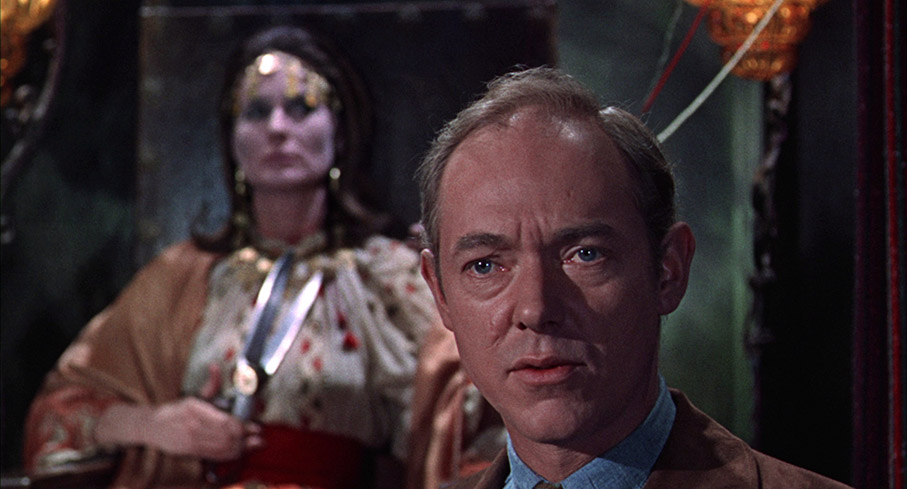
Torture Garden is set in one of those horror sideshows you tend to find only in movie carnivals but for all I know may well have existed in precisely this form. The barker here is Dr. Diabolo, who is played with some relish by Burgess Meredith, an actor who was capable of colourful performances that somehow rarely felt incongruously over-the-top. Having concluded his frankly rather lame-looking show, he offers his small audience the chance to witness something stronger if they are willing to pay. Having coughed up, they are confronted with a statue of Atropos, a mythological Greek female goddess of fate and destiny, and are invited by Diabolo to look into the shears she is holding aloft and witness their fate in the stories that unfold before them.
In the first tale, Enoch, self-centred playboy Colin Williams (Michael Bryant) badgers his dying uncle Roger (Maurice Denham) to reveal the location of a fortune that is reputed to be hidden somewhere in his house. Eventually, this callous interrogation causes Roger to die of a heart attack, and the almost indifferent Colin goes in search of the treasure unaided. Whilst digging in the cellar he uncovers a coffin, from which a healthy cat escapes and makes telepathic contact with him. A short while later, Colin discovers a chest full of gold coins, but soon learns that there is a moral price to be paid for its ownership.
In Terror Over Hollywood, ambitious starlet Carla Hayes (Beverly Adams) sabotages her flatmate's night out with influential Hollywood mover Mike Charles (David Bauer) in order to sneakily go in her place. At the restaurant, Mike gets into an angry disagreement with producer Eddie Storm (John Phillips) over a refusal to grant him a teasingly unspecified request, while Carla cosies up to long-established movie star Bruce Benton (Robert Hutton), whom she then begins secretly dating. But both Benton and Storm are guarding a secret, one that results in Charles's death after he threatens to expose it and that Carla's curiosity gets her dangerously close to uncovering.
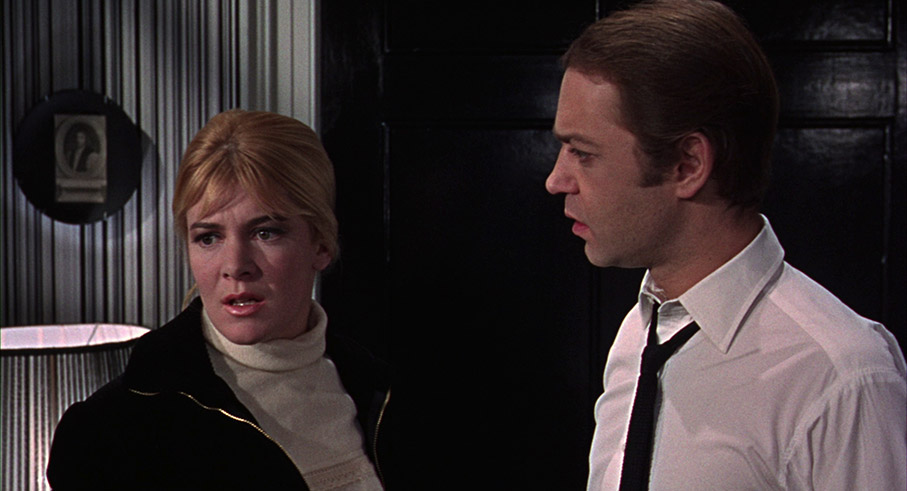
In Mr. Steinway, concert pianist Leo Winston (John Standing) has an almost intimate relationship with his piano, which he has named Euterpe after the Greek goddess of music. Euterpe was a gift from Leo's late mother, whose uninviting portrait hangs on the wall and whose spirit appears to linger within the instrument. When Leo begins dating young music journalist Dorothy Endicott (Barbara Ewing), the possessive Euterpe takes steps to intervene. The production design, however, which extends the black-and-white piano key motif onto the walls and floors, is excellent.
In The Man Who Collected Poe, Ronald Wyatt (Jack Palance), an obsessive collector of Edgar Allen Poe memorabilia, meets Lancelot Canning (Peter Cushing), a man whose collection easily outstrips his own but who has no interest in selling even a single item. After a few friendly drinks, Canning shows Wyatt the real jewels of his collection, but there is one prize that even Wyatt is completely unprepared for.
As with any portmanteau horror film, the quality of the stories is bound to fluctuate, and there will always be disagreement on which ones are the best, and what might work well in short story or comic book form doesn't always translate as effectively to film. Here, critical opinion tends to single out Mr. Steinway as the weakest link, in part because the concept of a possessed grand piano is difficult to sell as threatening, but also because there's an inevitability to the story's trajectory and conclusion that most should see coming long before it happens. A similar argument could be made against Enoch, of course, but horror (and indeed folklore) has a proud history of sinister felines, and it's thus oddly easier to accept that a cat could harbour the soul of a witch and have telepathic powers than swallow the concept of a piano possessed by the soul of an over-protective mother. And while the two lead performances in Mr. Steinway are fine, Michael Bryant excels as Colin in Enoch, required as he is to convincingly switch from cold-hearted bastard to a distressed victim of murderous mind control, both of which he pulls off with aplomb.
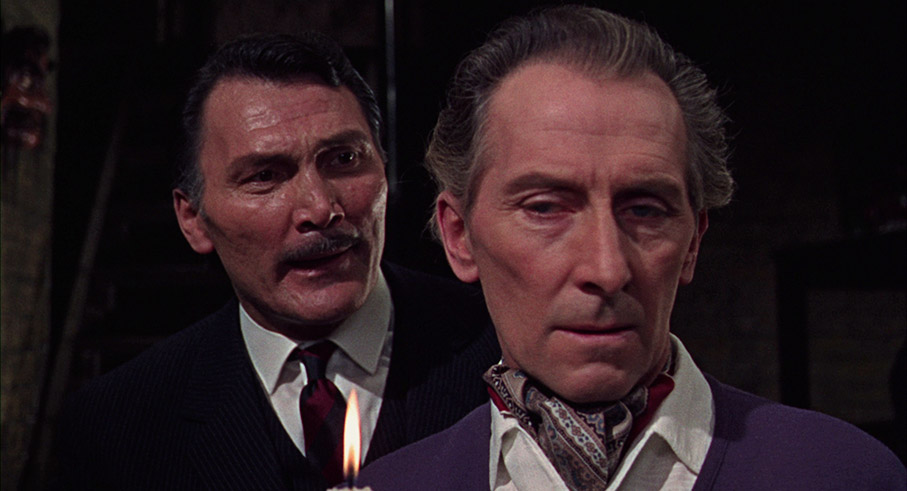
The Man Who Collected Poe benefits no end from its headline pairing of Jack Palance – in an uncharacteristic but still intriguing performance – and the always reliable Peter Cushing, plus a story twist that, while not too difficult to see coming, is both inventive and a logical conclusion to a story of two men who prepared to go to insane lengths to feed their shared obsession. Of course, we all know that Canning's fate is sealed from the moment he refuses to sell even a single piece from his collection to the desperate Wyatt, but this is still a compellingly developed tale, one that passes subtle commentary on genre fandom and whose conclusion can't help but feel like a deliberate nod to the Roger Corman Poe adaptations of the early 1960s. I'm saying no more.
Perhaps most intriguing is the sly commentary on celebrity and image-making of Terror Over Hollywood, which has more than a whiff of as-yet unwritten Ira Levin and unfolds as a series of neatly timed teases before showing its hand. It's also a story whose fantasy elements feel grounded in the future science rather than the supernatural, lending a layer of credibility to a notion that while far-fetched today, we could one day imagine coming to pass. It also contains the film's most unsettling scene, one that will likely give fans of a then recent John Frankenheimer feature a moment of chilling recall.
Time has stripped the stories of their ability to really scare us, and the final revelation of the linking story, though nicely built up to, is kicked in the nuts by some hopeless joke shop make-up and a misjudged attempt to effect a transformation using a too-visible dissolve between two mismatched shots that needed to be identically framed to stand a chance of working. But the stories themselves (well, three of them) are entertaining, well written, and enjoyably performed, and cameraman turned director Freddie Francis keeps things moving at a lick, has an eye for an interesting angle or viewpoint, and peppers the film with enough small twists and character detail (when Diabolo stages a fake electrocution, onlooker Gordon Roberts – played by Hammer favourite Michael Ripper – reacts with horror while the unfazed Carla quietly licks her lips) to reward a second viewing. Although not as widely known or seen (at least these days) as its colourfully titled predecessor, or as pitch-perfect as the later E.C. Horror Comics double, Torture Garden is still a most worthy entry into a well-loved series that fully deserves the special treatment given here.
When the film was first screened on American television, an additional 7 minutes was added to bring the running time up to the then preferred TV standard of 100 minutes. This additional material expands two scenes, and was clearly shot but not included in the theatrical cut rather than reshot at a later date. I have to admit that I preferred this cut.
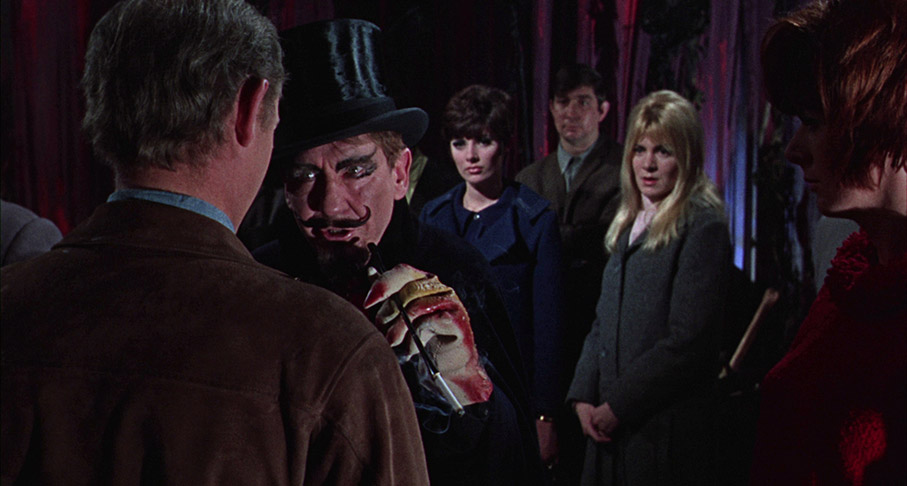
The first addition comes in the opening scene of the linking story, and has Diabolo provide a build-up for his staged electrocution, moving between the onlookers and encouraging them to empathise with the victim-to-be and imagine what it would be like to suffer as he is about to. This actually given the electrocution itself considerably more impact and suggests that Diabolo's show is not as cheapjack as it appears to be in the theatrical cut.
The second addition comes early on in the Terror Over Hollywood sequence, immediately after Mike Charles has had his disagreement with Eddie Storm. This handily answers a couple of questions that we were previously left to work out for ourselves, making it clearer how Carla hooked up with Bruce Benton and providing the specifics of how Charles came to an unfortunate end.
The Blu-ray sports a solid 1.85:1 1080p transfer, that has a gloomy, earthy look that feels authentic to the filmmakers' original intentions, as evidenced in the warmth of brighter colours when they do make an appearance. The sharpness and level of detail may not be reference quality, but both are still very good and certainly justify the HD-only release. Black levels are solid and do sometimes swallow up shadow detail, but the image appears to have been lit with this intention. A fine level of film grain is visible throughout, and dirt and dust have been cleaned up and any former damage repaired.
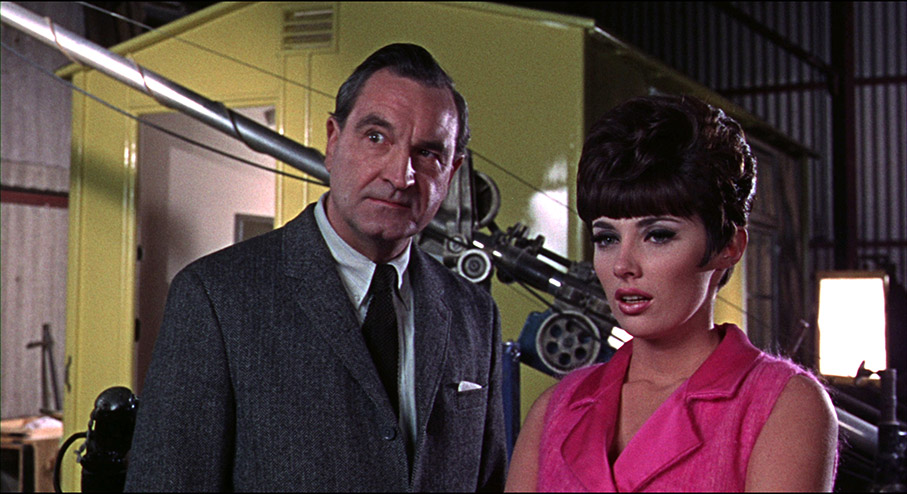
The PCM 1.0 linear mono track is clear and damage-free within the usual range restrictions for a film of this vintage, with pleasing reproduction of the score by Don Banks and Hammer regular James Bernard.
Optional subtitles for the deaf and hearing impaired are also available.
The Guardian Interview with Freddie Francis (77:00)
Guardian interviews are becoming a welcome irregular feature on Indicator discs, but are often audio-only and great though these always are, it is nice to see as well as hear the interviewees. I was expecting another audio-only track here, so did a small joyous jump when I discovered that this was a video piece. It's headed up by the usual warning about sometimes problematic audio quality, but this only really applies to the audience questions – it appears to have taken the BFI a few years to twig that having specific audio coverage of the questions would be a neat idea. Conducted at the National Film Theatre (now the BFI Southbank) in July of 1995, this interview with an energetic and talkative Freddie Francis is conducted by Alan Jones, a name and face that should be familiar to every horror fan in the country by now. Francis is an immensely entertaining delight here, recalling how he made his way into the film industry, sharing anecdotes about the shooting of Glory and Cape Fear, noting that no-one could speak rubbish and make it believable better than Peter Cushing, and assuring us that David Lynch is a lot of a fun and a lovely guy, just as we suspected. He tips his hat to his regular lighting gaffer and fellow cinematographers Haskell Wexler and Conrad Hall, reveals why he had his name taken off the credits of the 1989 The Dark Tower, remembers his time working for Hammer and Amicus as hugely enjoyable, and curiously suggests that the problem with modern camera lenses is that they are too sharp. There's so much more. A terrific extra.
Production Supervisor Ted Wallis on 'Torture Garden' (4:15)
A down-to-earth Wallis recalls making the film as a fun experience with a first-class group of people and confirms that Milton Subotsky loved writing and editing, something that comes up repeatedly in the extras – intriguingly, Freddie Francis claims he wasn't good at either.
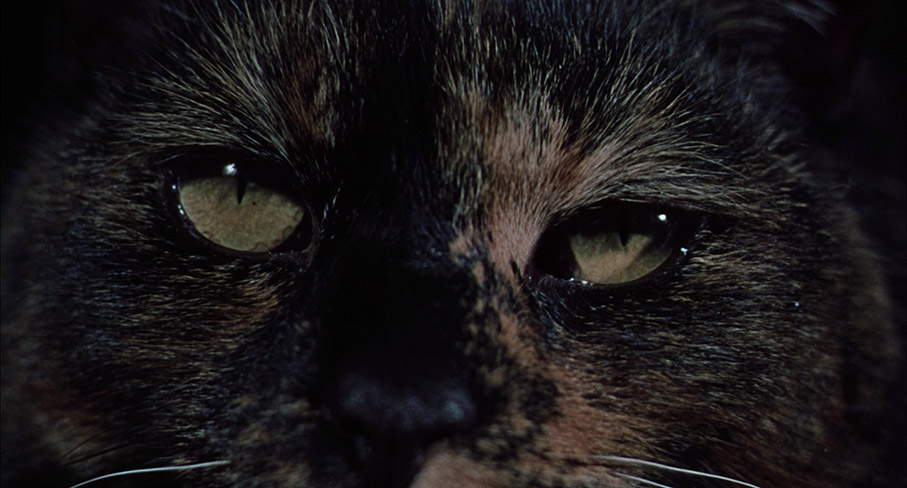
Ramsey Campbell on Robert Bloch (16:37)
Cheery horror author Ramsey Campbell recalls first discovering Bloch's work through short stories that terrified him, his delight at finding his name printed close to Bloch's in the anthology in which his own first short story was published, and contacting and striking up a long-standing correspondence with the author. I was certainly intrigued to learn that Bloch was a really funny guy and that Campbell could imagine him working as a stand-up comedian had he not become an author, and it's nice to know that he was happy with the film adaptation of what has become his most famous novel. Ramsey also gives all four of the stories in Torture Garden the quick once-over, exploring briefly what they tell us about Bloch's interests and influences.
Fiona Subotsky on Milton Subotsky (8:19)
Producer Milton Subotsky's widow and prominent London-based psychiatrist, Dr. Fiona Subotsky, looks back at her husband's early film career and the process of hunting out new short stories to adapt for the big screen, and passes positive comment on the Amicus portmanteau films and her favourite segments of Torture Garden.
Kim Newman on 'Torture Garden' (24:53)
As ever, after watching this typically information-crammed interview with writer, reviewer and genre aficionado Kim Newman, I was left with the feeling that I'd probably learned just about everything I could possibly need to know about the film. There's quite a bit on Robert Bloch (much of which was new to me), some commentary on the actors and an explanation for the presence of American leads, and he was clearly as disappointed with the final twist makeup as I was and for the very same reason. Great stuff.
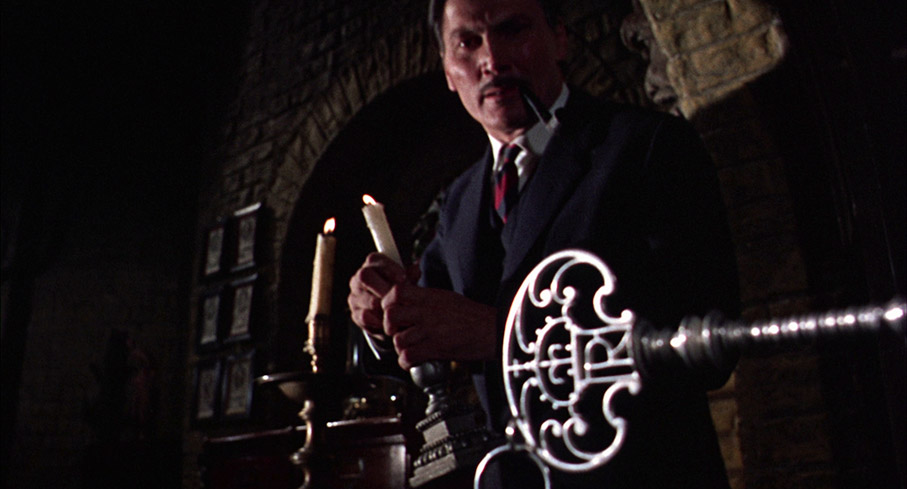
Theatrical Trailer (2:36)
Bloody hell, this really is littered with spoilers, including the final shot and a spoken revelation of the end-of-film twist. If you've not seen the film, steer clear of this until later.
Stills Gallery
124 slides of high resolution production stills, all except one is in crisp monochrome.
Lobby Cards and Posters Gallery
62 slides of hand-coloured lobby cards (including some bearing the French, Spanish and German titles), pages from the campaign booklet, and a number of international posters, all scanned at high resolution.
Booklet
Following a full set of production credits, we are treated to an enjoyable and detailed essay on the film by Laura Mayne, who usefully lists where the four Bloch tales here were originally published. This is followed by a number of extracts from interviews with producer, Milton Subotsky, which cover a lot of ground and make for entertaining reading. A similar format is adopted for extracts from several interviews with writer Robert Bloch, the first of which was conducted with him when he was just 18 years of age. He gets a little testy at Milton Subotsky's habit of rewriting scripts, but looks back at his time with Amicus as a largely happy one. Finally, we have a short but entertaining piece on the promotional gimmicks used to sell the film, my favourite being the salon that offers to style your hair after the film has left it standing on end.
It's perhaps inevitable that Indicator would select (or perhaps have easier access to) one of the less widely seen entries in the Amicus horror portmanteau cycle, but with the presentation here they've set the bar for any Blu-ray releases of other films in the series that I'd love to think might follow. It would certainly be great to see Tales from the Crypt and The Vault of Horror receive similarly luxurious treatment, but for now, this will do me just fine. A solid transfer and a fine set of extras. What more could you want? Warmly recommended.
|